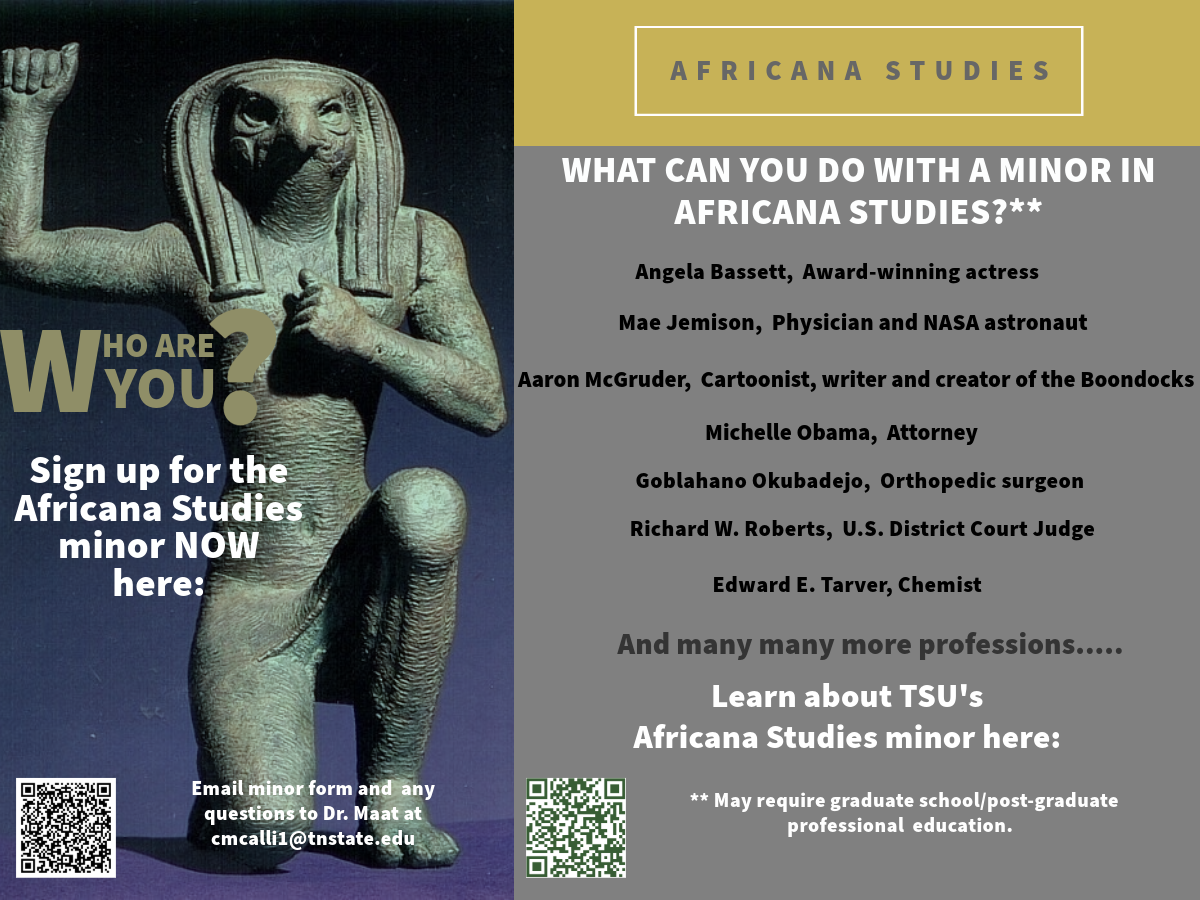Africana Studies
A Study of Origins
Why study Africana Studies at TSU?

The Africana Studies minor is open to students throughout the University regardless of major. The Africana Studies Program offers an 18 credit hour Minor designed to complement a student’s major in one of the University’s degree granting programs. The Program’s curriculum and pedagogy are designed to prepare students for success in a diverse and increasingly interdependent global economy and job market.
The study of the Black culture and life, including Africa and its Diaspora, is essential to the University’s mission as an institution of higher education.
How can a minor in Africana Studies impact my future?
The Program has links with public and private sector organizations that provide opportunities for Africana Studies Minor candidates to gain valuable experience through Internships, and the Program’s Field Studies Office offers outstanding study abroad opportunities.
Furthermore, the Africana Studies Program serves as a resource center for the Black community -- including Africa and the African Diaspora -- for schools, government agencies, businesses, and other agencies and community constituencies across the state of Tennessee.
Students from any discipline at TSU may opt for the Minor in Africana Studies as a complement to their degree program. The Minor in Africana Studies, coupled with their major, gives them an advantage in the job market and in graduate and professional studies.
Career Opportunities: In Africana Studies, we assist you in selecting courses that will help you meet your life and career goals. A Minor in Africana Studies can help prepare students for graduate and professional studies in a variety of disciplines, and enhance the chances of landing both public and private sector careers. Employers are increasingly concerned that their employees understand issues of diversity and tolerance, and are conversant with global and international issues.
Advising
If you are interested in learning more about the Africana Studies minor, please contact:
Dr. Sekhmet Maat, Eliot Hall 207, cmcalli1@tnstate.edu
Program Overview
In order to obtain a minor in Africana Studies, you will need to complete 18 hours focused on African American or African issues. These 18 hours are broken down as follows:
Undergraduate Minor Core (9 semester hours). All of these classes are mandatory:
AFAS 2010 Introduction to Africana Studies
AFAS 2030 African Diaspora
AFAS 4600 Independent Studies and Research
Minor candidates are required to complete an additional 6 hours of Africana Studies courses (at least 3 of which must be 3000 or 4000 level), selected from the following list, in consultation with their Africana Studies adviser:
AFAS 2010 Physical Anthropology of Africa
AFAS 2110 Cultural Anthropology of Africa
AFAS 2020 Survey of Africa
AFAS 3000 African Male: Identity, Culture, and Expressions
AFAS 3050 African Female: Identity, Socialization, and Status
AFAS 3100 Psychological Impact of Enslavement and Colonization
AFAS 3400 African Spiritual Philosophy I
AFAS 3600 African Extended Family
AFAS 3620 African-American Family
AFAS 3650 The African-American Community
AFAS 3800 African Spiritual Philosophy II
AFAS 3950 The Great Debate
AFAS 3990 Field Studies
AFAS 4120 Classical African Civilization
One additional elective (3 semester hours) from the following list:
ENGL 3800 African Literature
ENGL 3850 Caribbean Literature
GEOG 4120 Geography of Africa
HIST 4880 Africa and the Trans-Atlantic Slave Trade
HIST 4850, 4860 History of Africa I and II
HIST 4890 Modern Africa, 1960-Present
HIST 4910, 4920 African-American History I, II
POLI 4920 Black Politics
Core Learning Outcomes
- Ability to demonstrate verbally and in writing an understanding of the nature and purpose of knowledge production and utilization, with special attention to indigenous and diasporic African systems of knowledge.
- An appreciation of the centrality of Africa in world civilization, and an understanding of the historic, cultural, linguistic and religious forces that shape the place of black people in today’s increasingly global and interconnected world.
- Ability to use Black social theories and paradigms to collect, measure, organize, analyze and synthesize data on the major challenges facing Black people, and to create compelling presentations that advance reasonable solutions.


